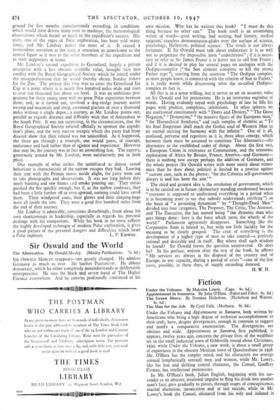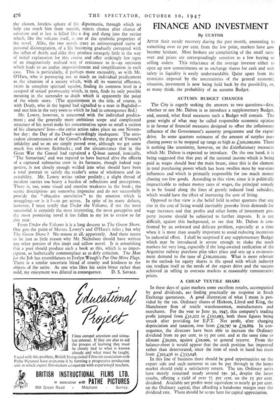Fiction
Under the Volcano. By Malcolm Lowry. (Cape. 9s. 6d.) Appointment in Samarra. By John O'Hara. (Faber and Faber. 8s. 6d.) The Green Shore. By Norman Nicholson. (Nicholson and Watson. 8s. 6d.) The Man for the Job. By Cyril Falls. (Methuen. 9s. 6d.)
Under the Volcano and Appointment in Samarra, both written by Americans who bring a high degree of technical accomplishment to their craft, have, despite divergencies, enough in common to suggest and justify a comparative examination. The divergencies are obvious and wide. Appointment in Samarra, first published, it appears, twelve years ago, concerns the private lives of the wealthier set in the small industrial town of Gibbsville round about Christmas, 1930, while Under the Volcano, a new work, is about a small group of expatriates in the obscure Mexican town of Quauhnahuac in 1938. Mr. O'Hara has the simpler mind, and his characters are average sensual (emphatically sensual) men and women, while Mr. Lowry, like his lost and drifting central character, the Consul, Geoffrey Firman, has intellectual pretensions.
In Mr. O'Hara's book, Julian English, beginning with his sur- render to an obscure, irrational impulse to fling his drink into another man's face goes gradually to pieces, through stages of concupiscence, marital alienation, intoxication and at last suicide, while in Mr. Lowry's book the Consul, alienated from his wife and isolated in the chosen, loveless sphere of his dipsomania, through which no help can reach him from outside, rejects chance after chance of salvation and at last is killed like a dog and slung into the ravine which, like the volcano itself, is one of the symbolic properties of the novel. Alike, the two novels trace an uninterrupted curve of personal disintegration, of a life becoming gradually corrupted with the influx of death, and alike they produce strangely little in the way of initial explanation for this course and offer strikingly few signs of an imaginatively realised way of resistance to it—an omission which leads to an undue impoverishment and simplification in each case. This is particularly, if perhaps more excusably, so with Mr. O'Hara, who is portraying not so much an individual predicament as the situation of a society which, with all its material affluence, exists in complete spiritual squalor, finding its common level in a cesspool of sexual promiscuity which, in turn, finds its only possible meaning in the surrender to death which is apparently the point of the whole story. (The appointment in the title, of course, is with Death, who in the legend had signalled to a man in Baghdad— and met him in the very town to which he had in consequence fled.)
Mr. Lowry, however, is concerned with the individual predica- ment ; and the generally more ambitious scope and complicated structure of his novel make his concentration upon so small a section of his characters' lives—the entire action takes place on one Novem- ber day : the Day of the Dead—accordingly inadequate. The ante- cedent circumstances of the Consul's divorce, the degree of Yvonne's infidelity and so on are simply passed over, although we get some much less relevant flashbacks ; and the circumstance that in the Great War the Consul had captained a Q-boat named, ironically, 'The Samaritan,' and was reputed to have burned alive the officers of a captured submarine crew in its furnaces, though indeed sug- gestive, is not closely enough welded into what should have been a total portrait to satisfy the reader's sense of wholeness and in- evitability. Mr. Lowry writes rather prolixly ; a slight thread of incident carries too heavy a burden of reflections and perceptions. There is, too, some visual and emotive weakness in the book ; the scenic descriptions are somewhat imprecise and do not successfully provide the "objective correlative" to the emotion which is struggling—or is it ?—to get across. In spite of its many defects, however, I must testify that Under the Volcano, if not the most successful, is certainly the most interesting, the most perceptive and the most promising novel it has fallen to my lot to review so far this year.
From Under the Volcano it is a long descent to The Green Shore. One gets the point of Messrs. Lowry's and O'Hara's titles ; but why The Green Shore ? No reason at all, apparently. And there seems to be just as little reason why Mr. Nicholson should have written any other portion of this inept and callow novel. It is astonishing that a poet should produce such a book as this, which is so imper- cipient, so bathetically commonplace as to defy criticism. The Man for the 7ob has resemblances to Evelyn Waugh's Put Out More Flags. There is a similar uncertain blend of cruelty and kindness to the objects of the satire. As one who likes his satire bitter rather than
mild, my enjoyment was diluted in -consequence. D. S. SAVAGE.



































 Previous page
Previous page